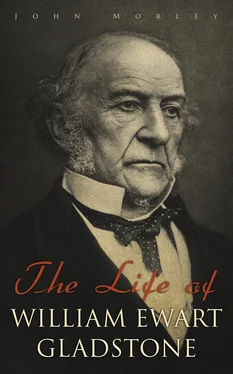To his father's person and memory, Mr. Gladstone's fervid and affectionate devotion remained unbroken. 'One morning,' writes a female relative of his, 'when I was breakfasting alone with Mr. Gladstone at Carlton House Terrace something led to his speaking of his father. I seem to see him now, rising from his chair, standing in front of the chimneypiece, and in strains of fervid eloquence dwelling on the grandeur, the breadth and depth of his character, his generosity, his nobleness, last and greatest of all—his loving nature. His eyes filled with tears as he exclaimed: "None but his children can know what torrents of tenderness flowed from his heart."'
The successful merchant was also the active-minded citizen. 'His force,' says his son, 'soon began to be felt as a prominent and then a foremost member of the community.' He had something of his descendant's inextinguishable passion for pamphleteering, and the copious effusion of public letters and articles. As was inevitable in a Scotsman of his social position at that day, when tory rule of a more tyrannic stamp than was ever known in England since the Revolution of 1688, had reduced constitutional liberty in Scotland to a shadow, John Gladstone came to Liverpool a whig, and a whig he remained until Canning raised the flag of a new party inside the entrenchments of Eldonian toryism.
In 1812 Canning, who had just refused Lord Liverpool's proffer of the foreign office because he would not serve under Castlereagh as leader in the House of Commons, was invited by John Gladstone to stand for Liverpool. He was elected in triumph over Brougham, and held the seat through four elections, down to 1822, when he was succeeded by Huskisson, whom he described to the constituency as the best man of business in England, and one of the ablest practical statesmen that could engage in the concerns of a commercial country. The speeches made to his constituents during the ten years for which he served them are excellent specimens of Canning's rich, gay, aspiring eloquence. In substance they abound in much pure toryism, and his speech after the Peterloo massacre, and upon the topics relating to public meetings, sedition, and parliamentary reform, though by sonorous splendour and a superb plausibility fascinating to the political neophyte, is by no means free from froth, without much relation either to social facts or to popular principles. On catholic emancipation he followed Pitt, as he did in an enlarged view of commercial policy. At Liverpool he made his famous declaration that his political allegiance was buried in Pitt's grave. At one at least of these performances the youthful William Gladstone was present, but it was at home that he learned Canningite doctrine. At Seaforth House Canning spent the days between the death of Castlereagh and his own recall to power, while he was waiting for the date fixed for his voyage to take up the viceroyalty of India.
CANNING
As from whig John Gladstone turned Canningite, so from presbyterian also he turned churchman. He paid the penalty of men who change their party, and was watched with a critical eye by old friends; but he was a liberal giver for beneficent public purposes, and in 1811 he was honoured by the freedom of Liverpool. His ambition naturally pointed to parliament, and he was elected first for Lancaster in 1818, and next for Woodstock in 1820, two boroughs of extremely easy political virtue. Lancaster cost him twelve thousand pounds, towards which his friends in Liverpool contributed one-half. In 1826 he was chosen at Berwick, but was unseated the year after. His few performances in the House were not remarkable. He voted with ministers, and on the open question of catholic emancipation he went with Canning and Plunket. He was one of the majority who by six carried Plunket's catholic motion in 1821, and the matter figures in the earliest of the hundreds of surviving letters from his youngest son, then over eleven, and on the eve of his departure for Eton:—
Seaforth, Mar. 10, 1821 .
I address these few lines to you to know how my dear mother is, to thank you for your kind letter, and to know whether Edward may get two padlocks for the wicket and large shore gate. They are now open, and the people make a thoroughfare of the green walk and the carriage road. I read Mr. Plunket's speech, and I admire it exceedingly. I enclose a letter from Mr. Rawson to you. He told me to-day that Mrs. R. was a great deal better. Write to me again as soon as you can.—Ever your most affectionate and dutiful son, W. E. Gladstone.
In after years he was fond of recalling how the Liverpool with which he had been most familiar (1810-20), though the second commercial town in the kingdom, did not exceed 100,000 of population, and how the silver cloud of smoke that floated above her resembled that which might now appear over any secondary borough or village of the country. 'I have seen wild roses growing upon the very ground that is now the centre of the borough of Bootle. All that land is now partly covered with residences and partly with places of business and industry; but in my time but one single house stood upon the space between Primrose brook and the town of Liverpool.' Among his early recollections was 'the extraordinarily beautiful spectacle of a dock delivery on the Mersey after a long prevalence of westerly winds followed by a change. Liverpool cannot imitate that now [1892], at least not for the eye.'
III
JOHN GLADSTONE AS SLAVEHOLDER
The Gladstone firm was mainly an East India house, but in the last ten years of his mercantile course John Gladstone became the owner of extensive plantations of sugar and coffee in the West Indies, some in Jamaica, others in British Guiana or Demerara. The infamy of the slave-trade had been abolished in 1807, but slave labour remained, and the Liverpool merchant, like a host of other men of equal respectability and higher dignity, including many peers and even some bishops, was a slaveholder. Everybody who has ever read one of the most honourable and glorious chapters in our English history knows the case of the missionary John Smith. 14In 1823 an outbreak of the slaves occurred in Demerara, and one of John Gladstone's plantations happened to be its centre. The rising was stamped out with great cruelty in three days. Martial law, the savage instrument of race passion, was kept in force for over five months. Fifty negroes were hanged, many were shot down in the thickets, others were torn in pieces by the lash of the cart-whip. Smith was arrested, although he had in fact done his best to stop the rising. Tried before a court in which every rule of evidence was tyrannically set aside, he was convicted on hearsay and condemned to death. Before the atrocious sentence could be commuted by the home authorities, the fiery heat and noisome vapours of his prison killed him. The death of the Demerara missionary, it has been truly said, was an event as fatal to slavery in the West Indies, as the execution of John Brown was its deathblow in the United States. 15Brougham in 1824 brought the case before the House of Commons, and in the various discussions upon it the Gladstone estates made rather a prominent figure. John Gladstone became involved in a heated and prolonged controversy as to the management of his plantations; as we shall see, it did not finally die down till 1841. He was an indomitable man. In a newspaper discussion through a long series of letters, he did not defend slavery in the abstract, but protested against the abuse levelled at the planters by all 'the intemperate, credulous, designing, or interested individuals who followed the lead of that well-meaning but mistaken man, Mr. Wilberforce.' He denounced the missionaries as hired emissaries, whose object seemed to be rather to revolutionise the colonies than to diffuse religion among the people.
Читать дальше









![William Frith - John Leech, His Life and Work. Vol. 1 [of 2]](/books/747171/william-frith-john-leech-his-life-and-work-vol-thumb.webp)


![William Frith - John Leech, His Life and Work, Vol. 2 [of 2]](/books/748201/william-frith-john-leech-his-life-and-work-vol-thumb.webp)